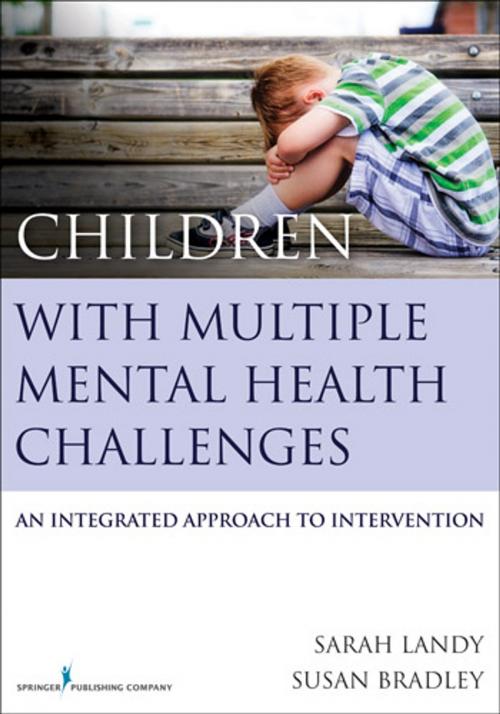Children With Multiple Mental Health Challenges
An Integrated Approach to Intervention
Nonfiction, Health & Well Being, Psychology, Child & Adolescent, Child Psychology, Pathological Psychology, Clinical Psychology| Author: | Sarah Landy, Ph.D., C.Psych, Susan Bradley, M.D., FRCP (C) | ISBN: | 9780826199614 |
| Publisher: | Springer Publishing Company | Publication: | October 15, 2013 |
| Imprint: | Springer Publishing Company | Language: | English |
| Author: | Sarah Landy, Ph.D., C.Psych, Susan Bradley, M.D., FRCP (C) |
| ISBN: | 9780826199614 |
| Publisher: | Springer Publishing Company |
| Publication: | October 15, 2013 |
| Imprint: | Springer Publishing Company |
| Language: | English |
"...[T]his book provides valuable information on taking care of children with complex mental health challenges. Chapters present information in tabular format, which makes the book easy to use in practice. The case vignettes are practical and helpful in understanding a child as a unique case and not just a diagnosis. The list of the most valid and reliable screening and assessment tools is valuable, as is the information on useful websites. The book also clearly provides up-to-date, basic information on neurobiology and genetics, as well as ongoing research in the field."--Doody's Medical Reviews
Mental health practitioners who work with children are often confronted with complex, difficult-to-treat mental health issues that do not respond to conventional methods of psychotherapy. These children have a web of multiple impairments that are comprised not just of emotional and behavioral issues, but also learning and other cognitive disorders.Children With Multiple Mental Health Challenges presents an innovative, evidence-based approach to understanding and treating this difficult population that integrates the child's development and functioning into diagnosis and treatment. It does not rely on diagnostic categories alone, but explores the functioning of children in several dimensions of development and considers multiple levels of influence.
The book builds on an individualized, integrated approach to present a variety of evidence-based strategies for working with children with multiple challenges. It considers children from preschool age to adolescence with a number of severe difficulties. These may include extreme aggression, oppositional defiant behavior, significant anxiety and depression, cognitive and academic challenges, delays in speech and language, problems with attention and concentration, sensory integration problems, and unresolved trauma. The treatment strategies included can be used by various specialists within the intervention team, as well as by parents and teachers.
Key Features:
- Presents an innovative approach to working with children with multiple disorders, often the most challenging cases for clinicians
- Moves beyond standard "recipes" for treatment planning to encompass developmental (including social and biological factors) and functional aspects of working with children
- Includes case studies as well as detailed treatment plans
- Offers treatment strategies that can be used by the intervention team, teachers and parents
"...[T]his book provides valuable information on taking care of children with complex mental health challenges. Chapters present information in tabular format, which makes the book easy to use in practice. The case vignettes are practical and helpful in understanding a child as a unique case and not just a diagnosis. The list of the most valid and reliable screening and assessment tools is valuable, as is the information on useful websites. The book also clearly provides up-to-date, basic information on neurobiology and genetics, as well as ongoing research in the field."--Doody's Medical Reviews
Mental health practitioners who work with children are often confronted with complex, difficult-to-treat mental health issues that do not respond to conventional methods of psychotherapy. These children have a web of multiple impairments that are comprised not just of emotional and behavioral issues, but also learning and other cognitive disorders.Children With Multiple Mental Health Challenges presents an innovative, evidence-based approach to understanding and treating this difficult population that integrates the child's development and functioning into diagnosis and treatment. It does not rely on diagnostic categories alone, but explores the functioning of children in several dimensions of development and considers multiple levels of influence.
The book builds on an individualized, integrated approach to present a variety of evidence-based strategies for working with children with multiple challenges. It considers children from preschool age to adolescence with a number of severe difficulties. These may include extreme aggression, oppositional defiant behavior, significant anxiety and depression, cognitive and academic challenges, delays in speech and language, problems with attention and concentration, sensory integration problems, and unresolved trauma. The treatment strategies included can be used by various specialists within the intervention team, as well as by parents and teachers.
Key Features:
- Presents an innovative approach to working with children with multiple disorders, often the most challenging cases for clinicians
- Moves beyond standard "recipes" for treatment planning to encompass developmental (including social and biological factors) and functional aspects of working with children
- Includes case studies as well as detailed treatment plans
- Offers treatment strategies that can be used by the intervention team, teachers and parents















